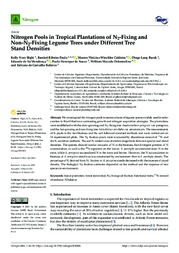Nitrogen pools in tropical plantations of N2-fixing and non-N2-fixing legume trees under different tree stand densities.
Nitrogen pools in tropical plantations of N2-fixing and non-N2-fixing legume trees under different tree stand densities.
Autoria: BIGHI, K. N.; PAULA, R. R.; CALDEIRA, M. V. W.; BURAK, D. L.; MENDONÇA, E. de S.; SOUZA, P. H. de; DELARMELINA, W. M.; BALIEIRO, F. de C.
Resumo: We investigated the nitrogen pools in monocultures of legume species widely used in reforestation in Brazil that have contrasting growth and nitrogen acquisition strategies. The plantations were established with the slow-growing and N2-fixing tree Anadenanthera peregrina var. peregrina, and the fast-growing and non-fixing tree Schizolobium parahyba var. amazonicum. The measurements of N pools in the tree biomass and the soil followed standard methods and were carried out on 54 experimental plots. The N2 fixation pools were evaluated by abundance natural of 15N and the N accretion methods. The soil N content was of similar magnitude between species and stand densities. The species showed similar amounts of N in the biomass, but divergent patterns of N accumulation, as well as the 15N signature on the leaves. S. parahyba accumulated most N in the stem, while A. peregrina accumulated N in the roots and leaves. However, the N accumulation in biomass of A. peregrina stand was less constrained by environment than in S. parahyba stands. The percentage of N derived from N2 fixation in A. peregrina stands decreased with the increase of stand density. The biological N2 fixation estimates depended on the method and the response of tree species to environment.
Ano de publicação: 2021
Tipo de publicação: Artigo de periódico
Unidade: Embrapa Solos
Observações
1 - Por padrão são exibidas publicações dos últimos 20 anos. Para encontrar publicações mais antigas, configure o filtro ano de publicação, colocando o ano a partir do qual você deseja encontrar publicações. O filtro está na coluna da esquerda na busca acima.
2 - Para ler algumas publicações da Embrapa (apenas as que estão em formato ePub), é necessário ter, no celular ou computador, um desses softwares gratuitos. Sistemas Android: Google Play Livros; IOS: iBooks; Windows e Linux: software Calibre.
Acesse outras publicações
Acesse a Base de Dados da Pesquisa Agropecuária (BDPA) para consultar o acervo completo das bibliotecas da Embrapa.

